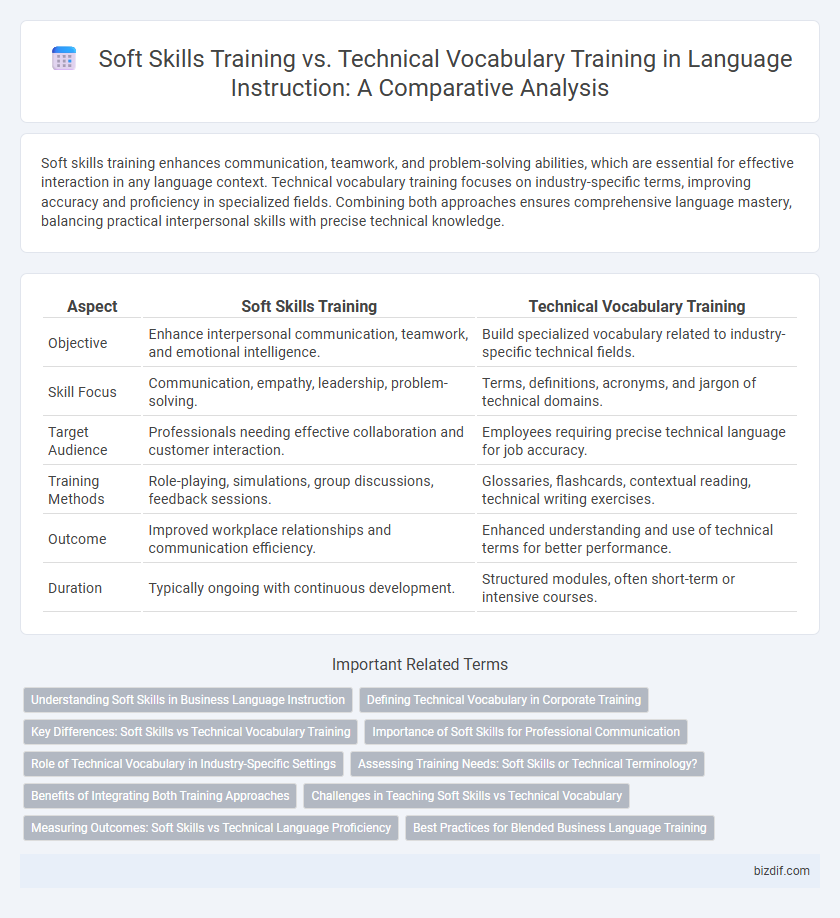Soft skills training enhances communication, teamwork, and problem-solving abilities, which are essential for effective interaction in any language context. Technical vocabulary training focuses on industry-specific terms, improving accuracy and proficiency in specialized fields. Combining both approaches ensures comprehensive language mastery, balancing practical interpersonal skills with precise technical knowledge.
Table of Comparison
| Aspect | Soft Skills Training | Technical Vocabulary Training |
|---|---|---|
| Objective | Enhance interpersonal communication, teamwork, and emotional intelligence. | Build specialized vocabulary related to industry-specific technical fields. |
| Skill Focus | Communication, empathy, leadership, problem-solving. | Terms, definitions, acronyms, and jargon of technical domains. |
| Target Audience | Professionals needing effective collaboration and customer interaction. | Employees requiring precise technical language for job accuracy. |
| Training Methods | Role-playing, simulations, group discussions, feedback sessions. | Glossaries, flashcards, contextual reading, technical writing exercises. |
| Outcome | Improved workplace relationships and communication efficiency. | Enhanced understanding and use of technical terms for better performance. |
| Duration | Typically ongoing with continuous development. | Structured modules, often short-term or intensive courses. |
Understanding Soft Skills in Business Language Instruction
Understanding soft skills in business language instruction enhances communication, teamwork, and emotional intelligence, which are critical for professional success. Unlike technical vocabulary training that focuses on industry-specific terms, soft skills training develops cultural awareness, negotiation tactics, and conflict resolution strategies within business contexts. Emphasizing these interpersonal competencies improves overall workplace collaboration and adaptability in multinational environments.
Defining Technical Vocabulary in Corporate Training
Defining technical vocabulary in corporate training enhances employees' comprehension of industry-specific terms, improving communication accuracy and efficiency. Soft skills training complements this by fostering effective interpersonal interactions, but technical vocabulary training targets precise language essential for specialized tasks. Integrating detailed term definitions ensures staff mastery of complex concepts, reducing misunderstandings and boosting overall productivity.
Key Differences: Soft Skills vs Technical Vocabulary Training
Soft skills training emphasizes communication, teamwork, and emotional intelligence to enhance interpersonal interactions and workplace collaboration. Technical vocabulary training focuses on specialized terminology critical for understanding and performing specific professional tasks with precision. The key difference lies in soft skills developing behavioral competencies, while technical vocabulary hones language specific to industry knowledge and technical proficiency.
Importance of Soft Skills for Professional Communication
Soft skills training enhances professional communication by developing emotional intelligence, active listening, and conflict resolution abilities, which are essential for successful workplace interactions. Unlike technical vocabulary training that focuses on industry-specific terms, soft skills foster interpersonal relationships and teamwork, improving collaboration and leadership. Employers prioritize candidates with strong soft skills as they contribute significantly to a positive work environment and efficient communication.
Role of Technical Vocabulary in Industry-Specific Settings
Technical vocabulary training is essential for precise communication and operational efficiency in industry-specific settings, enabling professionals to understand and use terminology accurately. Mastery of specialized terms reduces misunderstandings and enhances collaboration across departments, leading to improved project outcomes. This targeted language instruction supports seamless integration into professional environments by aligning communication skills with industry standards.
Assessing Training Needs: Soft Skills or Technical Terminology?
Assessing training needs requires identifying whether learners benefit more from soft skills development or technical vocabulary expansion based on their roles and industry demands. Soft skills training enhances communication, teamwork, and problem-solving abilities essential for client interactions and leadership, while technical vocabulary training improves precision and comprehension in specialized fields like IT, engineering, or medicine. Analyzing job requirements and performance gaps ensures tailored language instruction that maximizes workplace effectiveness and learner engagement.
Benefits of Integrating Both Training Approaches
Integrating soft skills training with technical vocabulary instruction enhances overall language proficiency by simultaneously developing communication effectiveness and subject-specific terminology mastery. This combined approach fosters better teamwork, problem-solving, and adaptability while ensuring precise understanding and usage of technical language within professional contexts. Organizations benefit from employees who can articulate complex information clearly and collaborate efficiently across multidisciplinary teams.
Challenges in Teaching Soft Skills vs Technical Vocabulary
Challenges in teaching soft skills include measuring progress and adapting to diverse learner backgrounds, while technical vocabulary training demands precision and retention of specialized terminology. Soft skills instruction often requires interactive, context-rich scenarios to develop communication, empathy, and problem-solving, contrasting with the rote memorization and repetitive practice typical of technical vocabulary learning. Balancing these approaches necessitates tailored methodologies to effectively address the unique cognitive and practical complexities of each training type.
Measuring Outcomes: Soft Skills vs Technical Language Proficiency
Measuring outcomes in soft skills training involves assessing improvements in communication, teamwork, and problem-solving through behavioral observations and feedback surveys. Technical vocabulary training focuses on language proficiency metrics, such as vocabulary acquisition tests and standardized language assessments tailored to industry-specific terminology. Quantitative data from language proficiency scores contrast with qualitative feedback used to evaluate soft skills effectiveness, highlighting the distinct evaluation methodologies for each training type.
Best Practices for Blended Business Language Training
Effective blended business language training integrates soft skills development with technical vocabulary instruction to enhance communication and industry-specific proficiency. Emphasizing role-playing scenarios and real-world case studies strengthens interpersonal skills, while targeted vocabulary exercises ensure mastery of specialized terms. Combining these methods optimizes learner engagement and accelerates practical language application in professional contexts.
Soft skills training vs Technical vocabulary training Infographic

 bizdif.com
bizdif.com